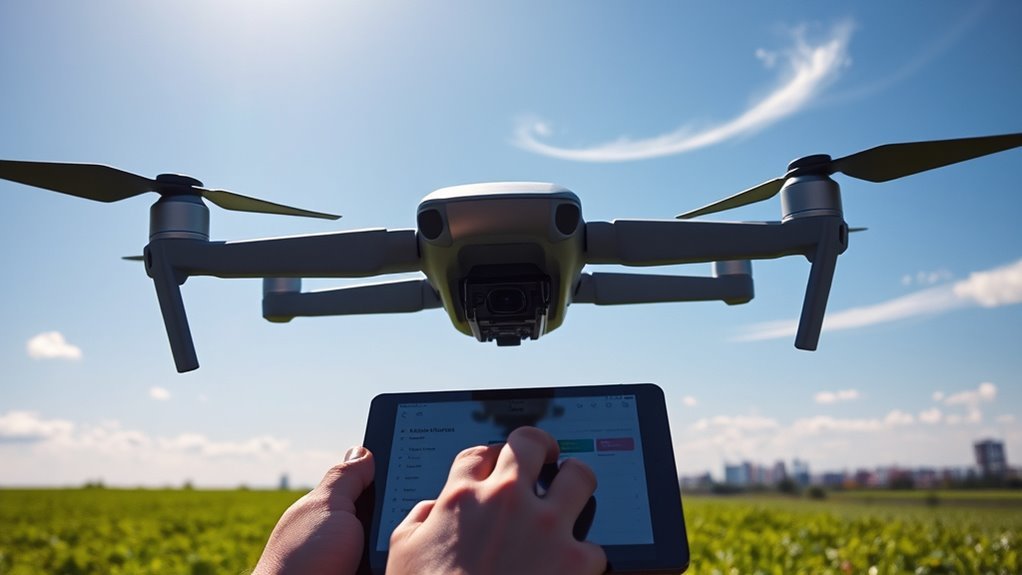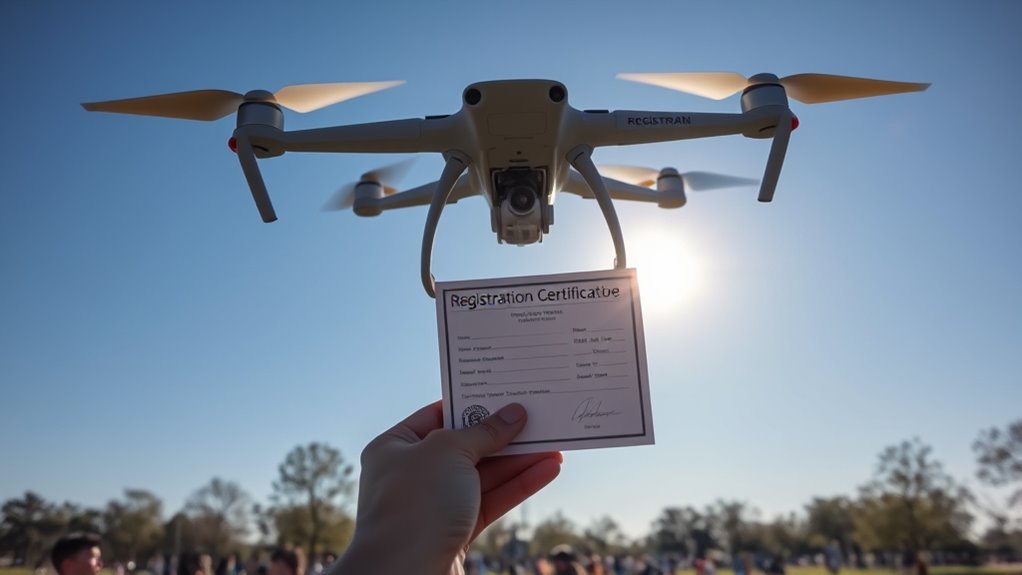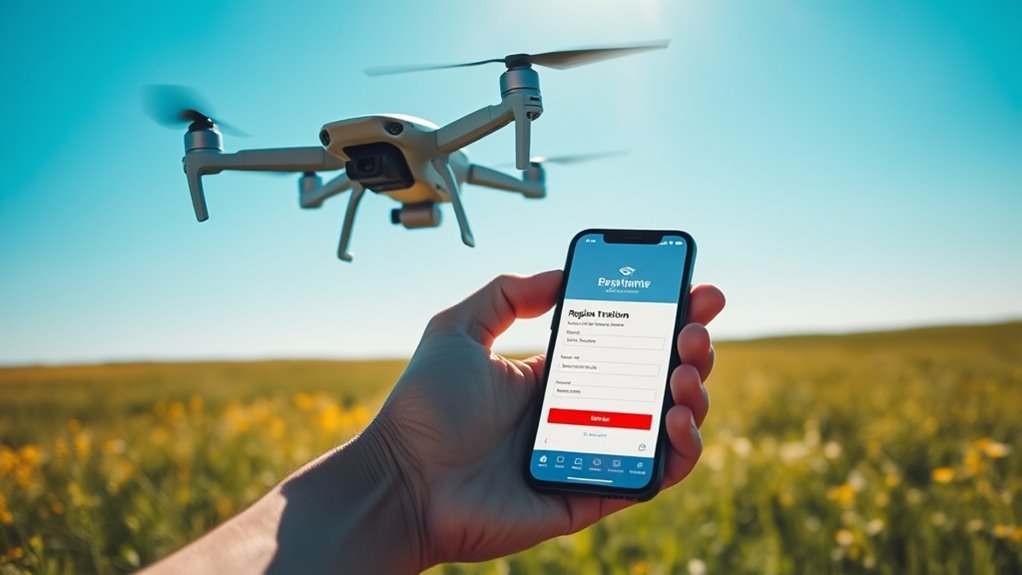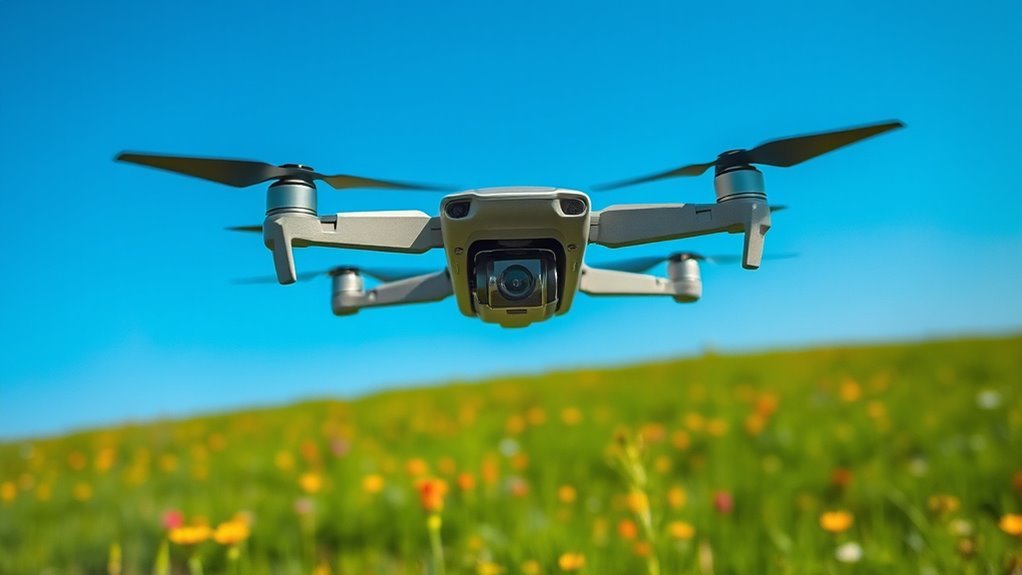Yes, you have to register your drone if it weighs over 0.55 pounds. This applies to both hobbyists and commercial users. Registering helps guarantee compliance with airspace regulations and enhances safety. The process is straightforward and costs around $5 for three years. If you fail to register, you risk fines and voided insurance coverage. Want to learn more about registration steps and best practices for responsible drone use? Let’s explore further!
Understanding Drone Registration Requirements

Have you ever wondered if you need to register your drone? Understanding drone registration requirements is essential for every pilot who values freedom in the skies. Drone regulations vary by country, but many places require registration for any drone over a certain weight. This registration process not only keeps you compliant but also guarantees safety in the airspace. It’s typically straightforward—usually involving filling out an online form and paying a small fee. By registering, you’re not just following the rules; you’re also protecting your right to fly freely. Ignoring these regulations can lead to fines and restrictions, so it’s wise to know the requirements that apply to you before you take off.
Who Needs to Register a Drone?

If you’re flying a drone for fun, you might still need to register it, depending on its weight. On the other hand, if you’re using a drone for commercial purposes, registration is not just required; it’s essential for compliance with regulations. Let’s explore who falls into these categories and what you need to know for registration.
Hobbyist Drone Operators
Wondering whether you need to register your drone as a hobbyist? If you’re flying for fun and your drone weighs more than 0.55 pounds, you must register it with the FAA. This registration helps guarantee drone safety and supports compliance with flight regulations. By registering, you’re not just following the rules, but you’re also contributing to a safer flying environment for everyone. It’s essential to know that even as a hobbyist, you’re responsible for maintaining safe flying practices, like avoiding restricted airspaces and respecting privacy. So, embrace your freedom in the skies, but remember that a little responsibility goes a long way in making certain everyone can enjoy this thrilling hobby. Happy flying!
Commercial Drone Users
When it comes to commercial drone users, registration is not just a formality—it’s a requirement. If you’re using a drone for business purposes, like photography, surveying, or inspections, you must register it with the FAA. This guarantees you’re operating within the law and maintaining safety standards. Alongside registration, consider getting drone insurance to protect your investment and cover any potential liabilities. Don’t forget the importance of flight training; it’s essential for mastering your drone and understanding airspace regulations. By guaranteeing you’re registered, insured, and trained, you’re not just following the rules—you’re embracing the freedom to operate your drone responsibly and effectively. So gear up, get registered, and take to the skies with confidence!
How to Register Your Drone

Registering your drone can feel overwhelming, but it’s a straightforward process that guarantees you’re flying legally and safely. First, visit the FAA’s online registration platform. You’ll need to create an account and provide some basic information about yourself and your drone. The drone registration process typically requires details like the drone’s make, model, and serial number. Don’t forget to have a credit or debit card handy, as you’ll need to pay the registration fee. Once you’ve submitted your information, you’ll receive a unique registration number that needs to be displayed on your drone. This assures you’re compliant with regulations. Remember, registering isn’t just a legal requirement; it’s a step towards responsible flying and enjoying your aerial adventures!
Registration Fees and Duration
When registering your drone, it’s important to know the associated costs and how long your registration will last. Typically, you’ll face a one-time fee, but this can vary based on where you live. Once registered, your drone’s validity usually lasts for three years before needing renewal, so keep that in mind!
Registration Costs Overview
Understanding the costs associated with drone registration is essential for any owner looking to comply with regulations. Registration fees can vary, but in the U.S., you’ll typically pay $5 for a three-year registration. This minimal cost is a small price for the freedom to fly your drone legally. When doing a cost comparison, consider the potential fines for flying unregistered, which can be hefty. Some states may have additional requirements or fees, so it’s wise to check local regulations as well. By investing in registration, you’re not only adhering to the law but also ensuring that you can enjoy your flying experience without unnecessary stress. Embrace your freedom responsibly by understanding these costs.
Duration of Registration Validity
Although it might seem like a minor detail, the duration of your drone registration is essential for maintaining compliance with regulations. Knowing when your registration expires helps you avoid fines and guarantees you can fly freely. Here’s what you need to keep in mind:
- Most drone registrations are valid for three years.
- You’ll need to handle registration renewal before the expiration dates to stay compliant.
- Failing to renew on time could lead to penalties or restrictions on your flying.
Staying on top of your registration’s duration can enhance your flying experience, allowing you to focus on the freedom that comes with piloting your drone. Don’t risk losing that by overlooking important registration details!
Consequences of Not Registering a Drone
Failing to register your drone can lead to serious legal consequences that you might not anticipate. The penalties involved can include hefty fines, and if you’re caught flying an unregistered drone, you could face enforcement actions from authorities. Beyond fines, there are significant legal implications that could affect your freedom to fly. Insurance risks also come into play; without registration, your coverage may be void, leaving you liable for damages or accidents. This could lead to costly out-of-pocket expenses that you simply can’t afford. Ultimately, not registering your drone can restrict your ability to enjoy flying while exposing you to unnecessary legal troubles. Additionally, understanding national forest drone regulations is crucial to ensure compliance and avoid penalties. Stay informed and protect your rights by ensuring your drone is registered. Furthermore, the FAA registration number must be displayed on your drone, serving as an essential identifier for legal operations.
Special Considerations for Commercial Drone Use
When it comes to commercial drone use, the stakes are even higher. You need to navigate a complex landscape of regulations to guarantee you’re operating legally and safely. Here are some key points to take into account:
- Obtain the necessary commercial permits before flying.
- Familiarize yourself with local safety regulations to mitigate risks.
- Stay updated on any changes in drone laws that could affect your operation. Additionally, it is crucial to understand your drone’s battery life to ensure it can handle your operational needs throughout the duration of your flight.
Additionally, ensure you complete your drone registration process to comply with legal requirements.
Ignoring these factors can lead to hefty fines or worse. By understanding the requirements, you not only protect your business but also embrace the freedom of flying within the law. Remember, knowing the rules empowers you to explore the skies while maintaining safety and compliance. So, gear up and get ready for a responsible and exciting commercial adventure!
Tips for Responsible Drone Operation
As you prepare to take to the skies with your drone, keeping safety and responsibility at the forefront is essential. First, always familiarize yourself with local regulations and verify your drone is registered if required. Prioritize drone safety by checking your equipment before flight and maintaining a safe distance from people and property. Additionally, you should complete the FAA registration process to ensure you meet all legal requirements. Practice good flight etiquette by avoiding crowded areas and respecting privacy—never fly over private property without permission. Maintain line-of-sight during your flight and stay aware of any potential hazards. Furthermore, be mindful of wildlife and avoid disturbing natural habitats. Remember, compliance with drone registration requirements is crucial to avoid penalties. By following these tips, you’ll enjoy the freedom of flying your drone while being a responsible operator in the skies. Happy flying!
Frequently Asked Questions
Can I Fly My Drone Without Registering It in Certain Areas?
You can fly your drone without registering it in some areas, but watch for local regulations and flight restrictions. Always check specific guidelines to guarantee you’re flying safely and legally, protecting your freedom to soar.
What Happens if I Lose My Drone After Registering It?
If you lose your registered drone, it’s essential to report it to authorities. Registration can aid in drone recovery efforts, helping others identify and return it, minimizing potential implications for liability or local regulations.
Are There Specific Drone Models That Don’T Require Registration?
Delightful drones under 0.55 pounds often enjoy registration exemptions. If you’re flying lightweight models, you might skip the paperwork. Always check regulations though, since rules can quickly change and vary by location.
Can I Transfer My Drone Registration to Someone Else?
You can’t directly transfer your drone registration to someone else. If you’re changing drone ownership, they’ll need to register it under their name, following the proper registration process to guarantee legal compliance.
How Often Do I Need to Renew My Drone Registration?
Think of your drone registration like a garden; it needs regular tending. You’ll need to renew it every three years, so mark your calendar and stay on top of the renewal process for seamless flying freedom.

